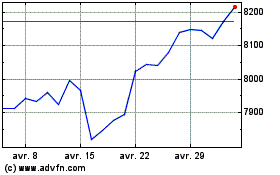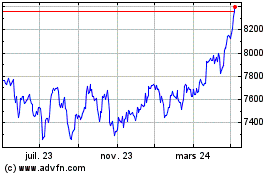By Riva Gold and Allison Prang
U.S. stocks slid Tuesday as investors weighed the latest trade
tensions between the U.S. and China and as President Donald Trump
said his June summit with North Korean leader Kim Jong Un "may not
work out."
Shares waffled between small gains and losses for most of the
session before turning lower in the final 90 minutes of trading.
Industrial stocks -- which powered Monday's rally on news the U.S.
would suspend its efforts to apply tariffs to $150 billion in
Chinese imports -- were among the biggest losers.
Boeing was the biggest drag on the blue chips, falling $8.90, or
2.5%, to $355.02, while Caterpillar dropped $2.72, or 1.7%, to
$156.20.
President Trump said Tuesday he isn't satisfied with the China
trade talks and also separately said his planned June 12 summit in
Singapore with Mr. Kim may not happen, adding to the uncertainty in
the market.
The Dow Jones Industrial Average fell 178.88 points, or 0.7%, to
24834.41, after rising Monday above 25000 for the first time since
March. The S&P 500 fell 8.57 points, or 0.3%, to 2724.44, and
the Nasdaq Composite dropped 15.58 points, or 0.2%, to 7378.46.
Financial stocks, meanwhile, were a bright spot, climbing 0.6%
in the S&P 500. Those shares rallied ahead of a House vote on a
bill that would relieve small and regional lenders from a number of
restrictions tied to the 2010 Dodd-Frank financial-overhaul law. If
the bill becomes law as expected, it would drastically cut the
number of banks subject to heightened Federal Reserve oversight by
raising a key regulatory threshold to $250 billion in assets from
$50 billion. After the close of trading, the House passed the
Senate-approved bill.
Justin Wiggs, managing director for Stifel Nicolaus, said
substantive deregulation is harder to obtain for bigger financial
firms, but that regionals stand to gain.
"They would see outsized benefit," he said.
The KBW Bank Index, which comprises 24 different banks including
large lenders like Bank of America and smaller firms like KeyCorp
and Comerica, closed up 0.9%.
Mr. Wiggs said the market's midafternoon slide occurred after
the S&P 500 tried and failed to break through a key technical
level, spurring investors to add to their bearish positions.
Crude-oil prices also turned lower in afternoon trading, with U.S.
crude settling down 0.2% at $72.13 a barrel.
In corporate news, shares of Micron Technology climbed $3.55, or
6.4%, to $59.03 after the memory-chip maker unveiled a $10 billion
stock-buyback plan. Shares of J.C. Penney fell 15 cents, or 6%, to
$2.35 after Chief Executive Marvin Ellison said he was leaving the
company to run home-improvement retailer Lowe's. Shares of Lowe's
fell $1.64, or 1.9%, to $85.75.
On the trade front, The Wall Street Journal reported the U.S.
and China agreed on the broad outline of a deal that would save
imperiled Chinese telecom giant ZTE. President Donald Trump said
Tuesday he envisions the company being fined as much as $1.3
billion but noted there is no final agreement on a deal.
"Anything tied to economic growth and the business cycle is
going to be bid up in this environment where we get news that maybe
the 'trade war' is less of a risk than it was prior to the
comments," said Jason Ware, chief investment officer at Albion
Financial Group.
Recent news "suggests that things are on hold for now, as far as
this escalating into something that would be truly bad for the
global economy and therefore global markets," he added.
For some, news around trade without specifics carries less
weight.
Brian Smoluch, portfolio manager for Hood River Capital
Management, who focuses on small-cap firms, said general comments
on trade with China are "too general to make any sort of concrete
investment move."
"The [market's] short-term gyrations are unpredictable," he
said.
The Stoxx Europe 600 edged up 0.3%, while the U.K.'s FTSE 100
rose 0.2% to a record close, supported for most of May by gains in
the U.S. dollar against the British pound and a rally in commodity
prices that has lifted shares of energy and mining companies.
In Asia, small earlier gains in the yen pressured Japanese
multinationals, with the Nikkei edging down 0.2% from a two-month
high.
--Giovanni Legorano contributed to this article.
Write to Riva Gold at riva.gold@wsj.com and Allison Prang at
allison.prang@wsj.com
(END) Dow Jones Newswires
May 22, 2018 18:45 ET (22:45 GMT)
Copyright (c) 2018 Dow Jones & Company, Inc.
FTSE 100 (FTSE:UKX)
Graphique Historique de l'Index
De Mar 2024 à Avr 2024

FTSE 100 (FTSE:UKX)
Graphique Historique de l'Index
De Avr 2023 à Avr 2024
